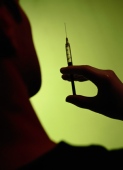- Could Your Grocery Store Meat Be Causing Recurring UTIs?
- Are You Making This Expensive Thermostat Error This Winter?
- Recognizing the Signs of Hypothyroidism
- 10 Strategies to Overcome Insomnia
- Could Artificial Sweeteners Be Aging the Brain Faster?
- Techniques for Soothing Your Nervous System
- Does the Water in Your House Smell Funny? Here’s Why
- Can a Daily Dose of Apple Cider Vinegar Actually Aid Weight Loss?
- 6 Health Beverages That Can Actually Spike Your Blood Sugar
- Treatment Options for Social Anxiety Disorder
Doctors Urge Meningitis Shots for Vulnerable Infants, Children


Infants and children who are at risk of contracting meningitis because of specific health problems should be vaccinated against the infection, according to updated recommendations from the largest pediatrician group in the United States.
And routine vaccinations for the potentially deadly infection should continue for adolescents and college students, the American Academy of Pediatrics says.
In its first statement on meningococcal vaccines since 2011, the academy notes that three such vaccines are now licensed for use down into infancy. They are deemed appropriate for youngsters age 2 months and older with immune deficiencies, missing spleens, sickle cell disease or other higher infection risks. Other young children don’t need the shots, the guidelines say.
Those same meningococcal vaccines and boosters, long recommended for children 11 and older, should continue to be given to those kids, the academy stated.
“We needed to have new recommendations so that pediatricians would understand how to use these vaccines in young infants and children, since they’re now available,” said guidelines author Dr. Michael Brady, associate medical director at Nationwide Children’s Hospital in Columbus, Ohio.
“We’re telling pediatricians that we don’t feel it’s necessary to give this vaccination routinely to young children,” he added, “but for children with select risks, it’s a good vaccine to give.”
The updated meningococcal recommendations are published online July 28 in the journal Pediatrics.
Meningococcal disease is linked to a variety of infections, including meningitis and pneumonia. Meningitis, an infection of the covering of the brain and spinal cord, strikes between 800 and 1,200 people in the United States each year, according to the National Meningitis Association.
Up to 15 percent of those affected die, while about one in five who survive ends up with permanent disabilities such as brain damage, hearing loss or limb amputations.
Typically, otherwise healthy children younger than 11 who develop meningitis have contracted the “B” strain. A vaccination for this type has not yet been approved by the U.S. Food and Drug Administration, which is why that age group is not routinely immunized, Brady said. There are five strains of bacterial meningitis and each tends to strike a specific age group or population, according to background information in the study.
The “B” strain of bacterial meningitis is what sickened a small group of college students at Princeton University in New Jersey earlier this year and killed a student from Drexel University in Philadelphia who had been in close contact with Princeton students.
But immune-compromised children, along with those who will travel to the “meningitis belt” in sub-Saharan Africa or participate in the Hajj pilgrimage to Mecca, should now be immunized with available vaccines, which target meningitis strains more common among adolescents and college students, he said.
Additionally, the updated recommendations said booster doses should be given after three years in high-risk children whose last dose was before age 7, while booster doses should be administered after five years in children whose last dose was at age 7 or older.
Brady noted that the meningitis outbreaks on college campuses over the last year from the “B” strain are not unexpected, since conditions are ripe for the disease to be transmitted among those living communally in dorms or military barracks. Higher rates of smoking and alcohol consumption are also associated with greater risks of contracting meningitis.
A meningitis “B” vaccine licensed in other countries was provided to students at Princeton through an emergency process, Brady noted. The academy’s recommendations for a “B” vaccine await FDA approval, possibly next year, he said.
Dr. Melissa Stockwell, a pediatrician at New York-Presbyterian/Columbia’s Morgan Stanley Children’s Hospital, said parents should know that meningococcal vaccinations are the best way to prevent the infection.
While parents don’t need to understand all the subtypes of meningitis, she said, they should consult their child’s pediatrician to make sure all appropriate immunizations are administered.
“For adolescents, young adults and the younger ones with special [vulnerabilities] — we want to make sure if you’re one of these groups, you’re vaccinated,” said Stockwell.
More information
The U.S. National Library of Medicine offers more on meningitis.
Source: HealthDay
Copyright © 2026 HealthDay. All rights reserved.










